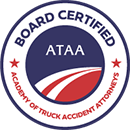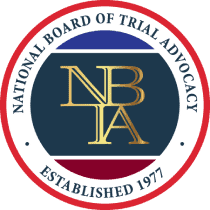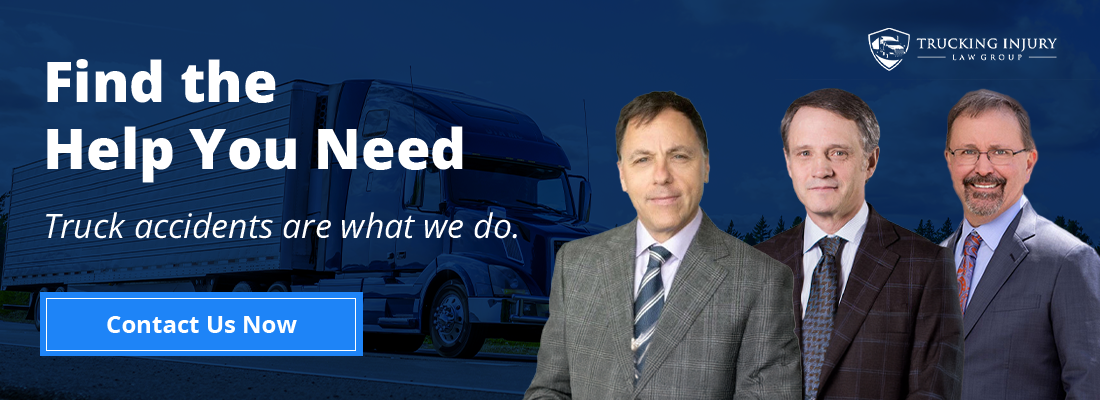Vancouver Truck Accident Attorney
Truck accidents are among the most devastating and complex of all vehicle collisions. In fact, the Federal Motor Carrier Safety Administration reported nearly half a million accidents involving commercial trucks in the U.S. in 2021, 110,000 of which resulted in injuries.
In Vancouver, our fast-paced transportation network means that, unfortunately, these accidents aren’t uncommon. The most recent data collected by the Washington State Department of Transportation (WSDOT) showed that, in 2022, Vancouver, WA suffered a total of 111 crashes involving large trucks. Clark County as a whole experienced 232 truck collisions.
The sheer size and weight of commercial trucks make any collision severe, often resulting in significant property damage, serious injuries, and sometimes fatalities. This is when the help of a qualified Vancouver truck accident lawyer becomes vital to protecting your rights.
Let’s take a look at the nature of these accidents, common causes, and injuries, and how to make sure that you receive justice and fair compensation if you find yourself involved in one. Contact us at Trucking Injury Law Group if you need assistance in filling a claim and navigating the legal system.
Why Do Tractor-Trailer Crashes Happen?
Vancouver, WA is often referred to as the city in between. This central proximity to the best of the Pacific Northwest brings a lot of benefits to residents: culture, commerce, community, events, history, and some of the most beautiful scenery in the nation.
But our in-betweenness also positions us squarely at the crossroads of a good deal of commercial trucking travel. Big rig trucks are a common sight on I-5 and I-205, connecting Vancouver and Washington state to Oregon.
And when commercial motor vehicles are present, so are truck accidents.
There’s more to it than traffic that explains why tractor-trailer crashes occur, though. It comes down to one thing: negligence.
Negligence means that someone failed to exercise reasonable care and hurt another person through their carelessness, reckless, or willful wrongdoing. Many trucking companies, to cut costs, save time, and boost profits, give in to negligence regularly in the form of:
- Violating federal and state regulations
- Hiring underqualified drivers
- Overloading trucks
- Skipping necessary truck inspections
- Forcing truck operators into driver fatigue with unreasonable schedules
- Failing to make sure trucks are maintained properly
Filing Truck Accident Claims in Vancouver, WA
Accident victims should know that they have rights and legal options, no matter how difficult the future may look after their trucking accident.
Although a personal injury claim can never undo the harm that has been done, a successful truck accident case can help make sure that:
- Harmful trucking industry negligence is not allowed to continue
- Responsible parties are held accountable for their actions
- Awareness is brought to serious issues that can be addressed through better legislation
- Future accident victims are protected from harm
- Victims are fairly compensated for both economic damages (like medical bills) and non-economic losses (like pain and suffering)
- Surviving families of fatal accidents are not left financially responsible for damages resulting from a loved one’s passing
Large trucks cause severe damage. You should never be forced to pick up the bill for a truck driver’s or company’s negligence. This is where a Vancouver truck accident lawyer can help. They can assist you in filing a claim that allows you to recover compensation for your losses. If you require assistance with that, be sure to contact us for a free consultation.
Common Injuries Resulting From Truck Collisions
Any crash involving a 40-ton tractor-trailer is likely to lead to catastrophic injuries (or even death) for those in the smaller passenger car.
Common truck crash injuries may include:
- Spinal cord injuries and paralysis
- A traumatic brain injury (TBI)
- Broken bones
- Blunt force trauma to the vital organs
- Disfigurement and scarring
- Permanent disability
- Burns and lacerations
- Emotional trauma leading to a post-traumatic stress disorder (PTSD) diagnosis
What You Need To Know About Federal Trucking Regulations
The Federal Motor Carrier Safety Administration (FMCSA) is the federal agency that’s responsible for regulating the commercial trucking industry.
The FMCSA issues rules and regulations that all commercial motor vehicle (CMV) operators are required to follow. The goal of these laws is to make commercial ground-based transport as safe as it can be for all involved—including passenger vehicle drivers who share the roadways with big trucks.
Here are just a few of the federal trucking regulations that owners and operators of commercial vehicles must follow.
Hours of Service Regulations
Hours-of-service (HOS) regulations limit how long a truck driver can work and drive without taking a rest.
The FMCSA has instituted the following HOS rules for property-carrying truck drivers:
- 11-hour driving limit after 10 consecutive off-duty hours
- 14 consecutive hour limit after coming on duty following 10 consecutive off-duty hours
- A mandatory 30-minute non-driving break after driving for eight cumulative hours without at least 30 minutes of break time
- 60/70 hour on-duty limit in seven or eight consecutive days; a seven or eight consecutive day period may be restarted only after 34 or more consecutive hours off duty
Cargo Securement and Overloading Regulations
Big rigs carrying heavy loads leave no room for negligence. One of the most dangerous situations involving a tractor-trailer is when cargo is unbalanced or comes loose on a crowded highway at top speed.
For this reason, there are strict federal regulations regarding how to load and secure cargo, weight restrictions, and what types of vehicles and license endorsements can carry certain types of hazardous cargo.
Requirements for Truck Inspections
The DOT and FMCSA require that all motor carriers “systematically inspect, repair, and maintain” all the vehicles in their fleet.
This includes:
- Ensuring all parts and accessories are in safe and proper condition at all times
- Maintaining required inspection and maintenance records
- Meeting federal criteria for safety standards
- Performing roadside inspection reports
- Writing daily post-trip inspection reports at the end of each driving day
- Performing comprehensive annual inspections on all fleet vehicles
- Meeting qualifications for inspection personnel, including special qualifications needed for brake inspectors
Truck Driver Physical Exam Laws
Truckers must be in adequate physical condition to successfully maneuver a multi-ton vehicle for days or weeks on a long-haul trip.
A driver who suffers from a condition like sleep apnea may be highly susceptible to driver fatigue. A driver with limited vision is a risky driver, especially at night. Drivers who are at risk of heart failure may have their condition worsened by stress, poor nutrition, lack of exercise, and long hours on the job.
To protect against the risk of these and other physical and mental health conditions, all CMV operators must undergo a fitness exam to determine whether they are physically qualified to drive a large commercial truck.
Truck drivers are required to undergo this DOT physical exam every two years unless they have a medical condition (such as high blood pressure) that requires them to be monitored more frequently.
This exam must be administered by a licensed medical examiner listed on the FMCSA National Registry.
Moving Violations
Truck drivers are required to follow both local traffic laws and requirements of operating CMVs as established by the federal regulatory agency. The FMCSA cites that some of the most common violations many drivers commit while operating a commercial vehicle include:
- Speeding
- Tailgating (following other vehicles too closely)
- Improper lane changes or turning
- Driving recklessly
- Failing to wear a seatbelt
- Handheld phone use
- Failure to yield right-of-way
- Railroad crossing violations
- Violating traffic signals (like running a red light or stop sign)
- Possessing alcohol while on duty
- Texting and driving
Types of Commercial Vehicle Accidents
Compared to crashes between two cars, certain types of semi-truck accidents are more likely—and more apt to be severe or fatal—for several reasons:
- Trucks are 20 times or more heavier than cars by weight
- Trucks are more likely to lose balance or stability and rollover due to a high center of gravity
- Smaller cars can become lodged under trucks in override and underride accidents
- Truck tires are susceptible to blowouts
- Hitches and couplings in semi-trucks can loosen or unhitch and lead to lost loads or jackknife accidents
- Braking distances are almost twice as long in big rigs than passenger cars
- Semi-trucks are surrounded on all four sides by large blind spots
- Commercial trucks require much more skill and experience to operate safely
Steps To Take After a Vancouver, WA Truck Accident
If you were involved in a commercial truck accident, there are measures you can take to prioritize your health and gather important evidence that can support your claim.
Although it’s difficult to think toward the future in the immediate aftermath of a traumatic trucking accident, the moments following a crash are the best time to secure evidence that will soon disappear.
For example, pictures and video of a recent accident scene can show the position of vehicles, skid marks on the roadway, the behavior of the CMV driver, and traffic and weather conditions at the time—critical evidence that will not exist in a matter of hours.
Even if you’ve never been involved in a trucking accident, it’s helpful to memorize the following steps so you’ll know what to do if you or someone else is involved in a collision:
- Call 911
- Get to safety
- Never move a person with severe injuries (especially possible spinal cord injuries)
- Take pictures of the accident scene
- Obtain name, contact, license, employer, and insurance information from the truck driver
- Take down name, contact, and insurance information for any other drivers involved
- Seek medical attention
- Contact a law firm of Vancouver attorneys who focus on semi-truck accident cases
Do You Need To File a Police Report After a Tractor-Trailer Crash?
According to Washington state law, you must make an accident report if there is injury, death, or property damage of at least $1,000.
Keep in mind:
- If a police officer makes a report at the accident scene, you do not need to submit another report.
- If a police officer does not make a report, you have four days to submit a report. If there are multiple parties involved, each driver must submit their own report.
Speak With a Truck Accident Attorney at No Cost
The fact is…your life may never look the same after a truck-involved accident.
At Trucking Injury Law Group, we know that, and we want you to have all of the security and peace of mind possible, knowing that we’re here and we care about your future.
Each truck accident attorney on our team has committed their legal career to helping people just like you, and we’re ready to help you seek justice and fair compensation for your losses.
Get in touch with our office today to schedule your free consultation with a Vancouver truck accident lawyer and take your first step on the road to recovery.










